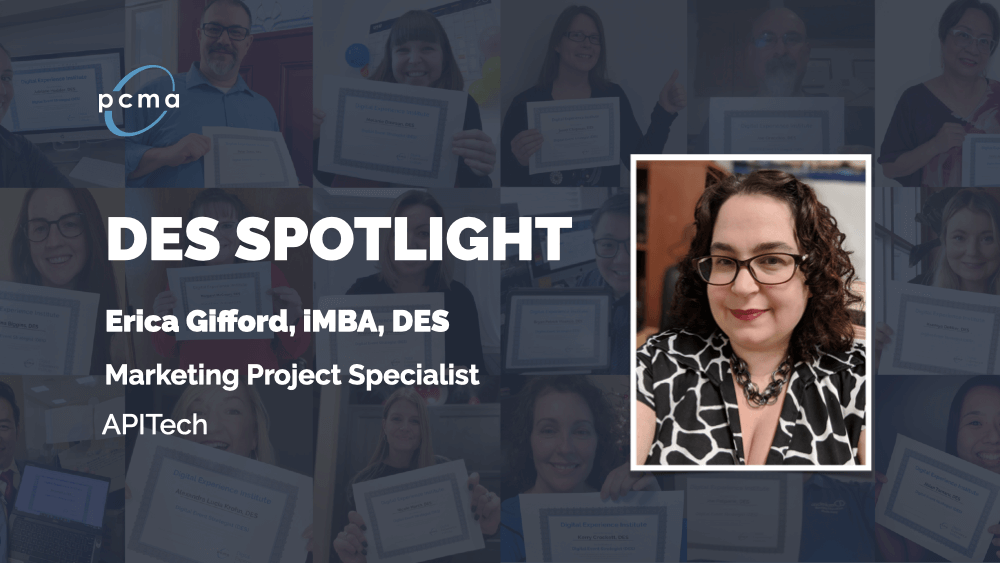Digital events transcend sectors, professions and companies. If 2020 has shown us anything it is that the world was not ready for such an abrupt transition toward digital, yet as we take bigger steps each day, digital is seeping into our way of life. Erica Gifford, Marketing Project Specialist at APITech had to make that transition with developing over 50 digital courses using what she learned in the DES Course. Here is her story.
Tell us a little bit about what you do and what made you pursue DES in the first place.
I’m currently the marketing project specialist for APITech. In 2020 when everything went sideways, we had to pivot on a dime. We went from doing about 16 major shows in a year to having none almost overnight. And we had to take the engagement learning program online that we normally did at our in-person events with customers, clients and partners. I had to come up with a way to do it.
In about six weeks, we had developed an online education program. By the end of the year, we had 58 courses, over 330 unique attendees that spanned about 65 different companies.
When the opportunity came up for me to get the Digital Event Strategist certification, I thought it was a perfect fit. As we had had to pivoted tightly, I really wanted to make sure I didn’t have any gaps in my knowledge, which is what the DES is great for.
Can you elaborate a bit more on your organization and the type of events you go to?
APITech is a manufacturer of RF, microwave and electromagnetic components. We support a lot of companies that support multiple industries such as defense, medical, wireless, industrial and others. We’re a B2B company and our sales lifecycle varies depending on whether we are selling a catalog part or a custom solution. Because our solutions are highly engineered and unique, we must do a lot of education to our sales partners. That’s really where our digital events shine.
Before the pandemic, we would exhibit at trade shows. In addition to bringing the physical parts with us to showcase our products, we also use a lot of digital media such as videos and 3D interactive programs to engage our audience there. I believe that I bring a lot of the knowledge from the DES course into our tradeshow space, especially with how we’re looking at hybrid in 2021 and beyond.
We’re going to exhibit at a trade show this year, and we all know that the attendance is going to be slashed. We’ve been asking ourselves, how do we still hit our ROI goal with a reduced attendance?
Truthfully, the answer in hybrid events. The answer is in doing a digital event inside of a physical event. We’re planning to host a unique webinar within our booth or in a session room. The speaker will be joining from the UK and will take questions live so that the on-site attendees will have a great experience. On the other hand, the online attendees will get the hype around the on-site event.
You have “marketing” in your job title, but you’re also in digital events. Tell us a bit more about how that’s the case in your organization.
As marketers, we are engagement specialists, and engagement is what online events are all about.
With in-person events, the main goal is for people to show up. With online events, it’s much more than just whether someone shows up: How did they interact during the event? Are people taking the tests or quizzes? How many are downloading the supplemental materials?
In digital events, the measurement is much cleaner — you attended this event, you learned about this topic. Three months later, you bought that thing. We can directly tie the purchase behavior back to the initial online event attendance. It’s much harder to measure with physical trade show booths.
I definitely love this part about digital events. It’s probably why my number one, hands-down favorite lesson from the DES course was module six on ROI measurement. The speaker was so engaging and really understood the challenges we face in making sure that we can prove our dollars are there. At the end of the day, it’s all business, and it’s all about lead generation and how we’re supporting the KPIs (key performance indicators) of our organization.
In addition to module six on ROI measurement, what key learnings from the DES course have you implemented in the event(s) you’ve worked on / are working on?
Definitely the alignment of the KPIs of our organization to the KPIs of the actual event. Know what your business needs and what your event needs, and make sure these two are aligned.
If a friend or colleague is on the fence about taking DES, what would you say to nudge them?
Take it, take it, take it! It is so worth it to smooth the gaps between what you think you know and what is out there. There is such a wealth of knowledge when you get together with your colleagues and learn about their experiences, their challenges and their successes. There is nothing like sharing those successes, challenges and experiences and learning from them. It is very much worth it.
———————————————–
The Digital Event Strategist Spotlight series features Digital Event Strategists and how they are making an impact in their work through digital and hybrid events.
For inquiries about the Digital Event Strategist certification, please complete this form.

